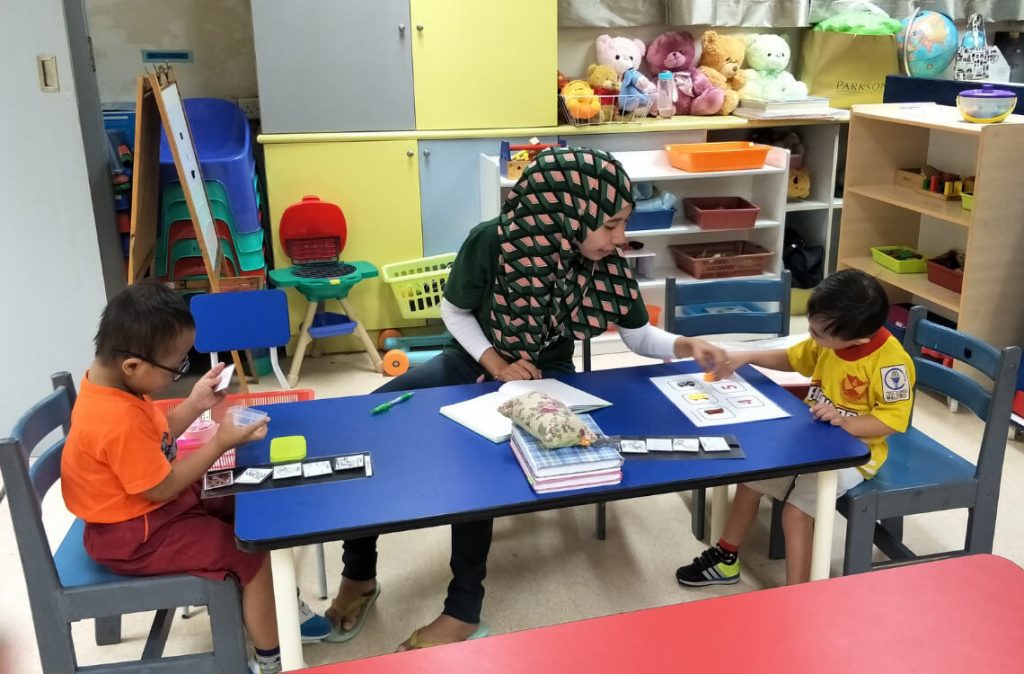Keeping up with lessons during the pandemic posed a challenge for most parents and children alike.
Students from the Kiwanis Down Syndrome Foundation (KDSF) were no exception. However, these young ones rose to the challenge by mastering the art of online education.
With dedicated teachers and a strong support system, the KDSF students managed to grow leaps and bounds, while staying safe in their homes.
Learning to connect via the Internet to ensure continuous education and growth, was a learning process, which proved well worth the effort.
Hence, it comes as no surprise that this year’s World Down Syndrome Day (WDSD) theme is #connect.
WDSD, celebrated on 21st March of each year, is a global awareness day, which has been officially observed by the United Nations since 2012.
KDSF-National Centre has been educating children with Down Syndrome since 1989.
For over 30 years, the focus of the centre has always been on providing the best early intervention programme for the students.
Angie Heng, KDSF-National Centre Executive Director, explained that this year’s theme was most fitting for the challenging months they have experienced.
We chose to follow the same theme #connect, according to the Down Syndrome International organisation, because truly we have all had to change and adapt the way we connect to each other. And we did not want those with Down Syndrome to be left out.
To mark this auspicious event, KDSF-National Centre choreographed 21 videos, featuring 21 students between the ages of 2 and 6.
Each short video highlights the progress of a student performing daily tasks most of us take for granted, such as running, table activities, and balancing on beams, Heng elaborated.
We wanted to show the world the possibilities and abilities of these children. So, in a very short time of starting physical lessons, we decided to take on the challenge of producing these 21 videos.
Because they did not have the means nor time to hire professionals, the videographers of the 21 videos were the KDSF-National Centre teachers themselves, with the use of their own mobile gadgets.
With little time to spare, the production was done between classes and completion of reports.
There are also teasers ready for viewing on the KDSF-National Centre social media sites, featuring some of the 20 teachers from the National Centre.
Heng explained that part of this great effort is to raise funds to help the foundation continue in their role of educating children with Down Syndrome, as well as to create awareness.
“The cost of educating one child is approximately RM800 per month, but we charge an average of RM300 per child. Hence, there is an urgent need for funding. We are not recipients of any government grant, and are only supported by Kiwanis Clubs.”
Unfortunately, during the pandemic, the KDSF-National Centre has seen a slight drop in enrolment.
“Some parents have had to take their children out of the school because of tight budgets; many lost their jobs or experienced pay cuts. While others have chosen to enrol their children in kindergartens.”
“Many corporate organisations would rather donate to specific, tangible projects; however, our project is educating Down Syndrome children and our main assets are our teachers,” Heng added.
“Throughout the pandemic, the KDSF-National Centre management ensured we all kept our jobs and as far as possible they tried to avoid pay cuts.”
“Because we are heavily dependent on donations, we sincerely hope the public will help support our cause to educate these children so that they can be inclusive in special education within government schools and society at large.”
The KDSF now manages 5 Down Syndrome centres in Malaysia – Petaling Jaya, Johor Bahru, Klang, Melaka, and Kulai.
These centres implement the Early Intervention Programme, a Special Needs Education Programme using the Robert Dellar’s Curriculum.
A Mother’s Wish To Raise Awareness
As a mother of a child born with Down Syndrome, I would like to see my child grow up as an adult who is able to live independently, said mother of 1, Ashley Pang.
“Early exposure to an inclusive environment is very important, especially for the child to be able to learn, adapt, and be part of our society.
“This can only be done if society accepts children and adults of different abilities with open hearts. Thus, we need to create awareness on the importance of an inclusive environment.”
Pang is convinced that this has to start with an “inclusive education”.
“Alex, 11, (her son) first attended the Special Needs Pre-School Programme at Kiwanis Down Syndrome Foundation National Centre. Then, he went to an inclusive kindergarten and is now in an inclusive primary school.
“Both inclusive schools provide good support for him to learn at his own pace and offer a balanced learning environment to cater to his needs, while allowing him opportunities for good social interactions with other children, including special-needs peers.”
Her wish is that more schools will be able to provide similar support for Down Syndrome children through proper funding and greater awareness.
To find out more about the Kiwanis Down Syndrome Foundation and watch the 21 videos, visit the KDSF website www.kdsf.org.my.
They can also be reached at +6 03-7803 0179 or info@kdsf.org.my.
For more information about parenting and family, please visit Motherhood Story.
